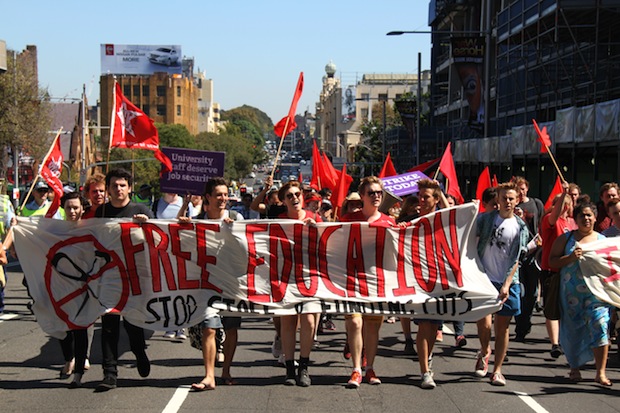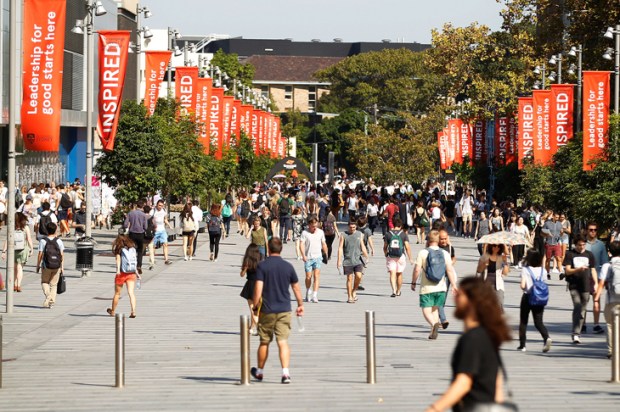Times are not as easy for the labour movement when the Coalition is in government, and without doubt that goes for the student union as well. With such an underwhelming track record under the purportedly education-friendly Gillard and Rudd governments, what hope does the hopelessly ineffective National Union of Students have of convincing an Abbott government to co-operate with its agenda? Very little, probably, unless it decides to change tack.
And there’s no better time than now to address the broken organisation that is ostensibly meant to represent all tertiary students in the fight for a better, more affordable education. It’s probably no stretch to say most NUS apparatchiks have very little real interest in the education of their fellow students. Some do, without doubt. But the majority are there to push their pet cause, be it the rights of Palestinians, better access to abortions, queer rights, unionism and most of all, their own political careers.
This is why the NUS is so ineffective. How can you possibly represent the educational needs of more than a million university students when this representation is conditional on the acceptance of a myriad of other positions students have no interest in, at best, or at worst, are opposed to? All university students are united by their desire for better education. But there would be hundreds of different views on abortion rights, conflict in the Middle East and unionism. And no student cares for the political antics of Labor subfactions attempting to outmanoeuvre each other.
Look no further than the recent annual conference, a nauseating display of political bickering over issues that hold no interest to the majority of the NUS’s constituency. The conference document outlines hundreds of potential policies, including solidarity with Pussy Riot, pushing for gender neutral bathrooms and asking the government to change the name of the Former Yugoslav Republic of Macedonia.
A long and ridiculous tantrum by one faction that another had removed mention of advocacy for expanding access to abortion, for instance. All this at the expense, of course, of campus student organisations, who have to hand over large sums of money so their student representatives can participate in this orgy of democracy.
How is it that this dysfunctional organisation will convince an Abbott government not to meddle with HECS, or to expand funding, or to do anything it wants? Will it even be part of the conversation? After several ‘national days of action’ last year, it convinced the Gillard government to do nothing but remove money from higher education. That is the sum total of its achievements. When the new minister, Christopher Pyne, mentioned his dislike of the new student services access fee, the NUS sprang into action. They held a rally (what a surprise) — except it took two weeks to organise, and went ahead even after the government quashed any possibility of changes for the time being.
When the government didn’t deny it may consider securitisation of HECS debts, there was another round of press releases decrying this dangers of the private market. Not only are there no real details, but securitisation normally involves merely assigning the ability to collect debt for an upfront benefit. No change in interest rates, no ‘extortionate fees’. Another bizarre and reflexive anti-private market tantrum for little effect.
If the NUS wants to be taken seriously by those making decisions, it needs to ditch its outdated, faction-driven structure and spend its money wisely. If you want to advocate for the NUS to pick up your cause, or if you want to climb the greasy pole that is Labor’s internal hierarchy, then the current system is a winner. But if the intention is to advocate for better student welfare, smaller class sizes, access to good HECS cover and institutional funding is the aim, and I’m led to believe it is (am I mistaken?), then NUS needs to work like any other lobbying organisation — hire a lobbyist.
However you feel about student unions on campuses, they exist and will continue to do so. And they will continue to fund (sometimes to the tune of tens of thousands of dollars) an umbrella organisation to raise student issues. That money needs to be better spent.
That’s not to say these ancillary issues aren’t worthy, but if you want to promote gay rights, join Australian Marriage Equality. There must be a dozen groups asking for expanded abortion rights. If you want to help the Palestinian cause, join the PLO. They are getting in the way of credible student advocacy.
Because as much as NUS functionaries may want these things, it won’t wash with a Coalition government (nor with some parts of the ALP). It deters these parties from engaging, and no number of ‘national days of action’ will change that. And it deters students who may otherwise be interested in lobbying for better education but for additional crusades from participating. Instead of spending vast amounts of money flying delegates to conferences and paying multiple office bearers, why not use it to pay professionals who have contacts in both parties and who know how to work insider campaigns.
Higher education could be a bipartisan cause; 900,000 domestic student voters should be a hard one to ignore. Access to higher education has numerous proven economic benefits, and better rights for international students will only improve the number coming to Australia. More funding will only increase the stock of highly education workers who contribute enormous amounts to Australian society and the economy. But the Coalition will never side with a student organisation that is also advocating a bevy of other left wing policies, it just won’t happen.
So the NUS and its leadership has to make the call: will they change and become a formidable and effective education lobby on behalf of Australian students? Or will they remain hopelessly mired in factional disputes that are less relevant to students than ever before?
Got something to add? Join the discussion and comment below.
Get 10 issues for just $10
Subscribe to The Spectator Australia today for the next 10 magazine issues, plus full online access, for just $10.
Kylar Loussikian, a former higher education writer at the Australian, is an editor at the Conversation website.
You might disagree with half of it, but you’ll enjoy reading all of it. Try your first month for free, then just $2 a week for the remainder of your first year.














Comments
Don't miss out
Join the conversation with other Spectator Australia readers. Subscribe to leave a comment.
SUBSCRIBEAlready a subscriber? Log in